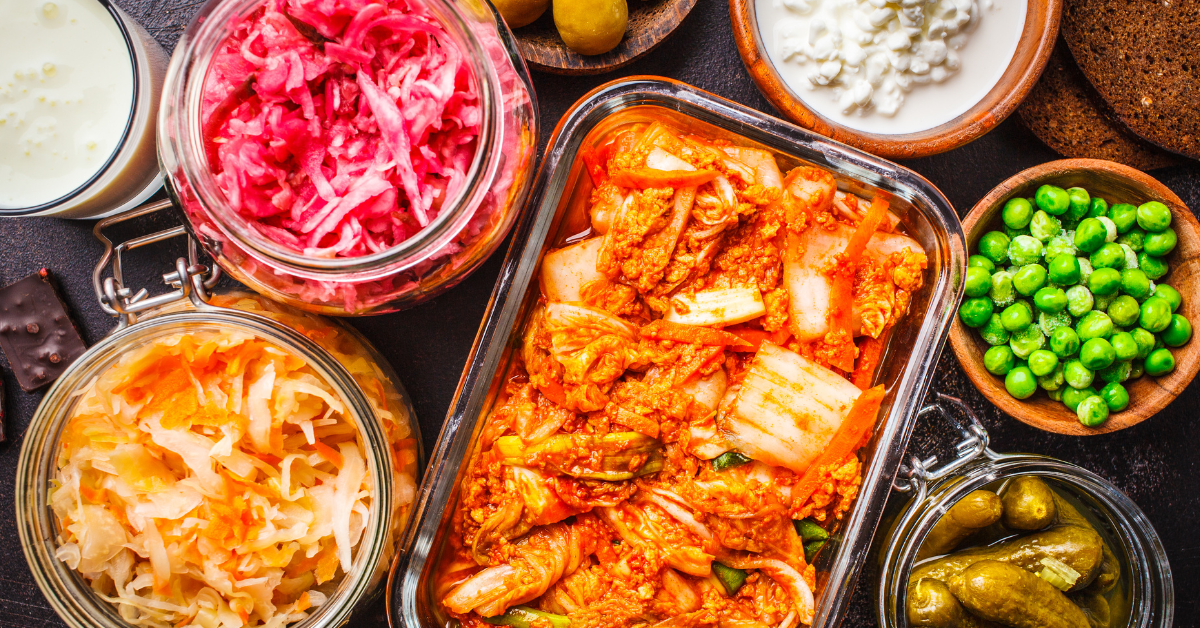Your gut is like a garden and fermented foods are the seeds that help it bloom. Inside your digestive tract lives a bustling world of trillions of microbes, collectively called the gut microbiome. This microbiome doesn’t just break down food and help with digestion. It helps regulate your immune system, produce essential vitamins, protect against harmful bacteria, and even influence your mood and brain health.1
But like any good garden, your gut needs the right nourishment to thrive. That’s where fermented foods come in.
Fermentation is a natural process where microorganisms like bacteria or yeast break down sugars and starches in food. The byproduct? Probiotics—live beneficial bacteria that support digestion, balance the microbiome, and reduce inflammation. Think of them as the “good guys” that help your gut stay resilient and robust.2
If you’re struggling with bloating, constipation, or irregularity, incorporating fermented foods into your routine could make all the difference. Let’s take a closer look at how this works, and five powerful foods to try.
How Fermented Foods Support Digestion
Fermented foods have been around for centuries, from yogurt in the Middle East to kimchi in Korea, not just for flavor or preservation, but because they enhance gut health.2
When foods ferment, bacteria (or sometimes yeast) consume the natural sugars and starches in them, producing compounds like lactic acid, alcohol, or gases. This process also creates probiotics, which help:2
-
Break down food into easier-to-digest forms.2
- Enhance absorption of nutrients like calcium, B vitamins, and iron.2
- Balance gut bacteria, preventing overgrowth of harmful strains.2
- Support the gut lining, which is key to immune health.2
Research has linked probiotic-rich diets with a reduction in bloating, constipation, and symptoms of irritable bowel syndrome (IBS) and inflammatory bowel disease (IBD), including ulcerative colitis and Crohn’s disease. Even your mood may benefit thanks to the gut-brain axis, which connects your digestive system directly to your brain via nerves, hormones, and immune messengers.2
Fermented Foods That Can Transform Digestion
Yogurt (with Live Cultures)
What it is: Yogurt is made by fermenting milk with live bacteria, commonly Lactobacillus bulgaricus and Streptococcus thermophilus. These cultures convert lactose into lactic acid, giving yogurt its tangy taste and creamy texture.3
Why it helps:
- Contains probiotic strains like Lactobacillus acidophilus and Bifidobacterium bifidum
- Improves lactose digestion for those with sensitivities
-
Supports gut lining and immune cells in the intestines
- Can reduce diarrhea caused by antibiotics or infections
How to enjoy it: Choose plain yogurt with “live and active cultures” on the label, and add fruit or nuts for a gut-friendly breakfast or snack. Avoid overly sweetened or flavored versions that may contain excess sugar.
Kimchi
What it is: Kimchi is a traditional Korean dish made by fermenting vegetables, usually napa cabbage and radish, with chili, garlic, ginger, and salt. It’s naturally rich in Lactobacillus plantarum and other beneficial bacteria.3
Why it helps:
- Increases diversity of gut flora
- May reduce gut inflammation and promote a healthy intestinal barrier
- Some research suggests it even helps with blood sugar and cholesterol levels
How to enjoy it: Use kimchi as a flavorful side dish, toss it into rice bowls or stir-fries, or even top your eggs or avocado toast with it for a spicy, tangy crunch.
Kefir
What it is: Kefir is a fermented milk drink made by combining kefir “grains” (a mix of yeast and bacteria) with milk. The result is a slightly fizzy, tangy beverage that’s packed with more probiotic strains than yogurt.3
Why it helps:
-
Contains a wide range of probiotics including Lactobacillus kefiri and Saccharomyces yeasts
-
Supports digestion by breaking down lactose and aiding nutrient absorption
- Helps regulate bowel movements and soothe intestinal inflammation
How to enjoy it: Drink kefir plain, blend it into smoothies, or pour it over granola. You can also find dairy-free versions made with coconut or almond milk.
Sauerkraut
What it is: Sauerkraut is finely shredded cabbage that’s fermented in salt and its own juices. It’s naturally teeming with lactic acid bacteria, especially if it’s raw and unpasteurized.3
Why it helps:
- Rich in Lactobacillus brevis and Lactobacillus plantarum
-
Helps enhance digestion and may relieve constipation
- Contains fiber and antioxidants that support gut health
How to enjoy it: Add raw sauerkraut to sandwiches, grain bowls, or salads. Just a few forkfuls a day can deliver a significant probiotic boost.
Miso
What it is: Miso is a savory paste made from fermented soybeans, often combined with rice or barley. It’s a staple in Japanese cuisine and contains the probiotic aspergillus oryzae.3
Why it helps:
- Aids in digestion by providing enzymes and good bacteria
-
May reduce gut inflammation
- Contains zinc, B vitamins, and antioxidants
How to enjoy it: Use miso to flavor soups, marinades, or salad dressings. Just avoid boiling it, excess heat can kill off the beneficial microbes.
Conclusion
If your digestion has been sluggish, unpredictable, or uncomfortable, it might be time to show your gut some love. Fermented foods are a natural, delicious way to nourish your microbiome and support smoother, more balanced digestion.
Start small and introduce one new food at a time and see how your body responds. Over time, these tiny microbes may offer big benefits not just for your belly, but for your brain, immunity, and even your skin.
References:
- Thursby, E., & Juge, N. (2017). Introduction to the human gut microbiota. Biochemical Journal – Portland Press. doi: https://portlandpress.com/biochemj/article/474/11/1823/49429/Introduction-to-the-human-gut-microbiota
- Leeuwendaal, N. K., Stanton, C., O’Toole, P. W., & Beresford, T. P. (2022). Fermented Foods, Health and the Gut Microbiome. Nutrients. doi: https://www.mdpi.com/2072-6643/14/7/1527
- Mutchler, C. (2025, July 2). 9 Fermented Foods That Can Boost Gut Health and Digestion. Retrieved from VeryWell Health: https://www.verywellhealth.com/fermented-foods-for-gut-health-11757504









